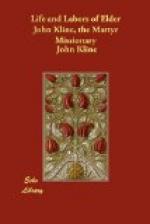John had many friends. All held him to be a prophet of extraordinary character; and if his popularity had tended to corrupt the honest simplicity of his heart he would not have borne this testimony to Jesus. But he goes still further in his disavowal of all claim to preferment by confessing and not denying that he is not the Christ. He says: “He must increase, but I must decrease.” Jesus was the sun rising in his splendor; John the moon paling in his light.
The church is the bride. The Lord is the bridegroom. “He that hath the bride is the bridegroom.” There is a doctrine of deep interest involved in John’s testimony. It concerns every one of us to know it. It is the relation subsisting between the Lord and the church. This relation is represented as that existing between husband and wife, the very nearest that can subsist between two human beings—the unification of one with the other to the extent that they are no more twain, but one flesh. Reference to this relation of the church to the Lord is to be found in the Scriptures at several places. Isaiah prophesying the glory of the true Christian church exclaims: “For as the bridegroom rejoiceth over the bride, so shall thy God rejoice over thee.”
But it is consistent and proper for a bride to adorn herself preparatory to her marriage. But even for this occasion she should be arrayed in modest apparel, as becometh saints. But God recognizes the propriety of suitable ornamentation, and uses it as a figure in these words: “My soul will greatly rejoice in the Lord, for he hath clothed me with the garments of salvation, as a bride adorneth herself with her jewels.” The garments of salvation beautifully symbolize the holy life of God’s saints, and correspond to the fine linen, clean and white, in which the bride, the Lamb’s wife, is arrayed, as described by John in the Apocalypse. Her jewels correspond to the divine truths of the Word, which ornament a good life.
I will now offer some practical thoughts on what I have stated, so as to draw the attention of your minds more closely to the subject. Some people seem to think it a matter of small moment whether one makes a public profession of religion or not. Such seem to satisfy their minds by concluding that God knows what is in their hearts, and that the church has no business to concern itself about them. They think they can live as good and as pure lives out of the church as in it. This last conclusion may be correct, for many do not live very pure or good lives in the church. But all this has nothing to do with God’s established order. A man might say: “I love that lady, and with her consent I will live a virtuous life with her. But I do not intend to marry her after the ceremonial style of most people. Marriage ceremonies are useless, and with her consent we will just go together as husband and wife, and so live; and whose business is it but our own?” In the first place I have




